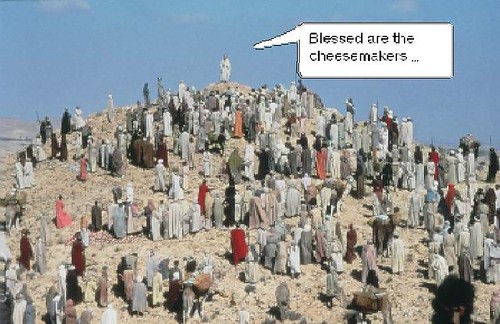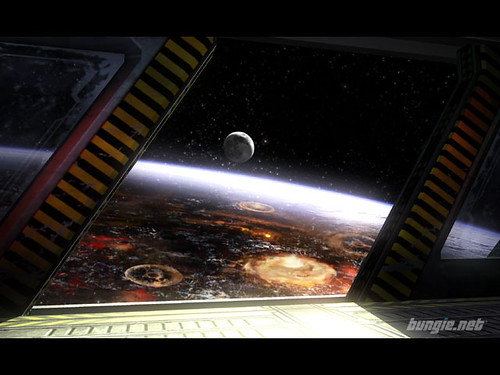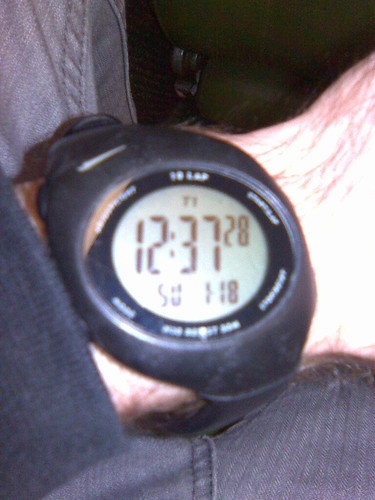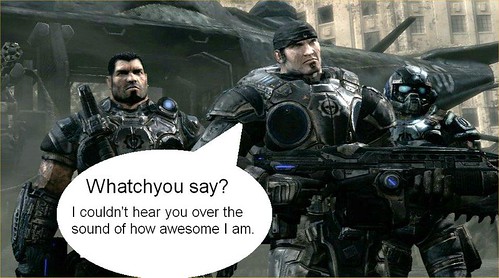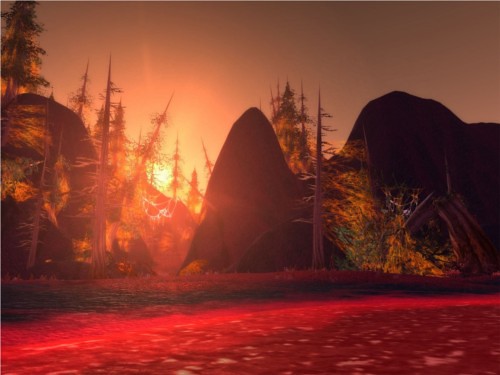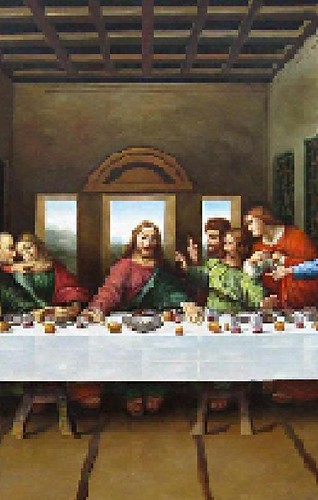
Jan 09 Round Table - Putting the Game Before the Book: What would your favorite piece of literature look like if it had been created as a game first? …rather than challenge you to imagine the conversion of your favorite literature into games, I challenge you to supersede the source literature and imagine a game that might have tried to communicate the same themes, the same message, to its audience.
Now I know the New Testament of the Bible is not strictly speaking one book, it’s made up of a bunch of them and they’re written by a number of different authors, however many Christians like to think of the Bible as expressing a single idea – or rather more specifically, the single voice of God. There are, as you may or may not know, many different views, perspectives and beliefs on how to read the Bible – all too many to count and list here in fact. So I will instead explain how and why I read the Bible in my own fallibility and imperfection and then get onto the interesting business of imagining how “The New Testament: The Videogame” (for Windows, Mac & Linux) would play and what it would be like if it were originally authored as a videogame.
I read the Bible because I do believe that it really is some kind of ‘designer’s handbook’ for life and living. And I believe in the central figure of the story – you know, that Jesus guy. Yeah he’s alright with me. However, I’m not altogether convinced at the moment that the Bible is as infallible as the institution often portrays and I similarly struggle to believe that it’s entirely reflective of exactly and specifically the intent of the author (talking about God as the author in this case not the human writers) but there are still plenty of people that do. And there are also plenty of people that think Braid is exactly authored the way Jonathan Blow wanted it to be. (Admittedly, that is rather a reduction of their arguments and points about the games, but an overarching theme of much of the discussion has been ‘what Blow was doing’ with the game and it’s hardly been studied in from the modernistic perspective as an independent work, studied in a vacuum if you will, with one notable exception.)
So let’s pretend that God sent his son Jesus to earth not in the first century but in the twenty-first instead. Two points make The New Testament for Windows, Mac OS and Linux a convincing possibility. Firstly, knowing that Jesus was a pretty contemporary dude for his time, it makes sense that he’d encourage his followers to be down with the ways and the means of the time. The 12 apostles would probably have held wicked awesome Halo LAN parties and frag each other late into the night, trash talking about who was greatest in the
Also, as someone who was dedicated to speaking to people in a way that they could understand, using parables and stories to communicate his message, it seems rather credible that his followers would be just as dedicated, and want to tell people about him via the medium that they are both well versed in and which is rapidly emerging as the newest medium for human expression.
Obviously throughout the short history of games there have been a bunch of limp wristed, patently pathetic Bible based videogames and I’ve only (thankfully) been witness to a few of them. The most high profile of recent bible games would have to be the Left Behind game, based on the popular ‘Left Behind’ series and which plays as a spiritual focused RTS. No game, as far as I know has tried to be the Bible, even if many have tried to re-tell the Bible. So how would the Bible authors make The New Testament: The Game?
While the gospels in the New Testament are about telling the story of Jesus, the point of the gospels is not found within in the narrative, that is, by reading, studying and learning the order of events. Instead it’s about character and characters, people that are both saintly and flawed. The important things to take away from the Bible are not names and places and dates, but implications and ideas. Let’s take a small look at one idea that this Jesus fellow wanted to get across – this short passage is from The Message version of the Bible, which has deliberately been paraphrased from the original Greek so as to (hopefully) speak in a contemporary vernacular much as it would have for readers in the first century.
(This is Jesus speaking)
“Be wary of false preachers who smile a lot, dripping with practiced sincerity. Chances are they are out to rip you off in some way or other. Don’t be impressed with charisma; look for character. Who preachers are is the main thing, not what they say. A genuine leader will never exploit your emotions or your pocketbook. These diseased trees and their bad apples are going to be chopped down and burned.”
The passage is from Matthew, Chapter 7, verses 15-20 (for those so inclined to go look it up) and the point Jesus is making could be told in any number of ways through a videogame.
Maybe the videogame of The Gospel of Matthew is a tile based top down RPG, where you play as a follower of Jesus or even play through a series of Galileans, Judeans, Pharisees and Sadducees in a kind of fractured narrative style game a bit like the Call of Duty games and their three-way US/British/Russian story splits. The ‘game’ could even be a series of fully fledged proto-games, like a harvest moon clone where, in one of a number of vignettes, you’re a poor fisherman performing your daily chores only to hear of a visitor in town promising to make your sick daughter well. However the trade off is that if you don’t catch enough fish then you’ll go hungry tonight and your daughter will only get worse. Do you investigate or ignore this stranger? Maybe he hangs around for a few days, with each day your daughter getting progressively sicker until she either dies or you decide you’re getting desperate and what could it hurt to just go and see? Simulating the conditions for a random encounter with Jesus could be a method of showing something about Jesus’ life to people – he was around for only so long before he had to be elsewhere and if he’s truly as important as we say he is then you’d better go see!
After a bit of play testing however, maybe Matthew decides that, as the currently game works it’s making people think that the message of the game is “Go see Jesus or your daughter will die” which is pretty extreme and not exactly what Matthew wants. So he goes back to the drawing board and for a second version creates an interesting dynamic story where your daughter’s chance of survival is a mix of random chance and how well you care for her, with story options for what Jesus would do when he heard she died, if she recovered on her own, etc, etc… Like the real world, in The New Testament: The Videogame sad and terrible things happen and they’re often out of our own control.
But just because Matthew is an indie dev of shmups and RPG’s in this scenario doesn’t mean that the disciple Luke will be – maybe he’s much more into the FPS. In his gospel, the focus is less on the experience of meeting Jesus and more about remediating the ideas that he espoused and personally represented. So to express something like the passage above – that charisma is less important than character – perhaps Luke designs a mod for an existing game, like Half-Life 2.
In The Gospel of Luke, a mod for Half-Life 2, he codes and makes changes to the levels, giving you the player the ability to divine the real nature of a character, and see past the facade. It’s probably a bit more of a ‘proof of concept’ demo than full mod because it only works on that first level after you get off the train and until you reach the building where you get chased by the combine. But in the first area of the game, it works by letting you touch a human or combine NPC to see a short flashback from an earlier moment in that person’s life – with each example being something the person has done that has contributed to making them the person that they really are. Maybe one of the flashbacks shows a person surrendering to the combine and turning collaborator, naming their friends as members of the resistance. A flashback for a particular Metrocop could show quick, rapidly cut scenes of the combine transformation process – how they were afraid before it happened, and how that fear turned to terror as their personality was destroyed and replaced with machine.
Why do you have this mechanic? There’s no in-story reason for it, but it’s a nice experiment as part of The New Testament for Windows, Mac OS and Linux. The point of the mod is to show that appearances can be deceiving and while there’s no ‘practical application’ involved with seeing these flashbacks it would probably change the way we perceive the particular NPC’s. Imagine if you could do the same thing in the real world – think of all the things you would rather keep hidden from random strangers, all the things you’ve ever done you’re not proud of.
So I’ll leave the rest of the imagining up to you – these are just a few ideas I half-baked in my noggin, I’m sure the real version would be way better and have much higher production values anyway. I mean, have you seen how much money is in Christian lifestyle books these days? Then again, maybe the early Christian’s would have been edgy and cool and gone pure indie – 8bit all the way. Yeah, I think that’s it. Solid.
